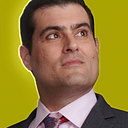My 3 arguments FOR Free Will
I got a lot of interesting feedback on my interview with Robert Sapolsky but none as forceful as Jordan Peterson who said to me on X:
“Continual performative contradiction is prima facie evidence of an unsustainable philosophical position. Either the actions, the belief or the adherence to coherence have to go @Robot_Sapolsky”.
In the spirit of continuing debate, I wanted to summarize my top Arguments for Free Will:**
1. Experience of Choice: Our subjective experience suggests we make choices freely. Daily, we encounter situations requiring decision-making, from trivial to significant matters, and feel in control of these decisions. This sense of autonomy and agency underpins the belief in free will, as it reflects our internal perception of making unconstrained choices.
2. Moral Responsibility: The concept of moral responsibility hinges on free will. Our legal and ethical systems are predicated on the assumption that individuals can choose between right and wrong. If free will didn’t exist, holding people accountable for their actions would be unjust, as it would imply punishing individuals for decisions made under compulsion or determinism.
3. Creativity and Innovation: Human creativity and innovation suggest the existence of free will. The ability to think abstractly, imagine new possibilities, and bring them into reality through choices that aren’t pre-determined by past events or natural laws indicates a level of spontaneous decision-making characteristic of free will.
Argument Against Free Will:
Determinism: The primary argument against free will is determinism, which posits that all events, including human actions, are ultimately determined by preceding events and natural laws. From this perspective, our choices are the result of an unbroken chain of prior occurrences and genetic predispositions, leaving no room for free will. The deterministic view argues that what we perceive as a choice is merely the result of complex, causally linked events over which we have no ultimate control.
So, we must believe in free will; we have no choice!
Have a M.A.G.I.C. Week
Appearance
I recently sat down with Robinson Erhardt to discuss the expansion and inflation of the universe, the relationship between theory and experiment in cosmology, gravitational waves, the BICEP experiment, and a lot more.
Genius
After more than 35 years, astronomers find the first strong evidence of a neutron star at the center of Supernova 1987A.
Image
Going where no one had ventured before, with nothing but a jetpack and a whole lot of courage!
In 1984, Bruce McCandless proved the sky’s not the limit — it’s only the beginning.
Conversation
Kip Thorne is a theoretical physicist known for his contributions to gravitational physics and astrophysics. In 2017, he was awarded the Nobel Prize in Physics along with Rainer Weiss and Barry Barish for decisive contributions to the LIGO detector and the observation of gravitational waves.
Lia Halloran is an award-winning painter and photographer. She received her BFA at UCLA and her MFA in Painting in Printmaking at Yale. She serves as Associate Professor of Art and Director of the Painting and Drawing Department at Chapman University in Orange, CA.
Today, Kip and Lia will guide us through the process of creating their wonderful book.
